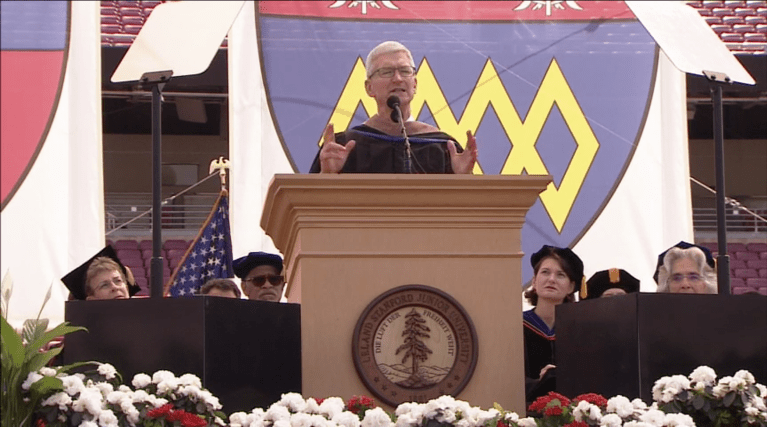“Your time is limited, so don’t waste it living someone else’s life.”
This is the advice former Apple CEO Steve Jobs gave at Stanford’s 114th Commencement in 2005, and it’s the advice current Apple CEO Tim Cook gave to students at Stanford’s 128th Commencement on Sunday.
But the backlash that has surrounded major corporations like Apple in the 14 years between the two speeches — the data leaks, fake news and frauds — took center stage in Cook’s plea for graduating students to take responsibility for the consequences of their creations.
“If you built a chaos factory, you can’t dodge responsibility for the chaos,” Cook said. “Taking responsibility means having the courage to think things through.”
In alluding to recent failures in responsibility, Cook didn’t shy from calling out those closest to the University. He joked about his time on the Auburn University sailing team, just months after Stanford fired its own sailing coach for accepting payments to the program in exchange for recruitment spots in admission. He condemned Stanford dropout Elizabeth Holmes’ fraudulent company Theranos, which pedaled “false miracles in exchange for a single drop of your blood.”
“Technology doesn’t change who we are,” Cook said. “It magnifies who we are, the good and the bad … From the garden of Eden to today, it’s our humanity that got us into this mess, and it’s our humanity that’s going to have to get us out.”
As much as Cook’s address focused on the consequences of technology, he frequently returned to humanity as the source of hope for its own future. Humanity could be jeopardized, he said, if technology is allowed to eliminate privacy — motivating a loss of exploration, creation and growth among individuals.
“In a world without digital privacy — even if you have done nothing wrong but think differently — you begin to censor yourself,” he said.
Even in “an age of cynicism,” Cook said, Stanford remains a home for “big dreams” and the potential to realize them. He emphasized the importance of interdisciplinary efforts, noting that the challenges facing humanity cannot be solved by any single industry.
In his appeal to humanity, Cook didn’t shy away from death, especially that of Jobs, his predecessor and mentor. Before Cook’s address, Stanford President Marc Tessier-Lavigne called for a moment of silence to recognize the deaths of four Stanford students this year.
“When [Jobs] was gone, truly gone, I learned the real visceral difference between readiness and preparation,” Cook said. “ … You’ll never be ready. But you’re not supposed to be.”
He encouraged graduating students to think of their work as existing in a world bigger than themselves, a world where they will never be able to see the final product of their efforts. To this point, he recalled his experience growing up in Alabama, far from the events of the Stonewall riots that would help pave the way for gay and transgender rights in America.
“If [equality] wasn’t going to be given, then they were going to have to build it themselves,” he said. “… What I would not know for a long time is what I owed to a group of people I’ve never known in a place I’ve never been.”
The heroes at Stonewall, Cook said, were not expecting to have such a wide-reaching role in society. It is important, he said, to match ambition with humility, the recognition that one’s work is “about serving something greater.”
“You can’t take it with you,” he said. “You’re going to have to pass it on.”
Contact Holden Foreman at hs4man21 ‘at’ stanford.edu.
